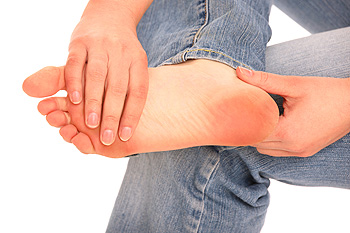
 There are several nerves in the foot, and the foot condition that is known as Morton’s neuroma can indicate a nerve enlargement. A common place for this to occur is between the third and fourth toes, and nerves that have become swollen in this area may be irritated. Common symptoms patients experience with Morton’s Neuroma can include cramping, a tingling sensation in the toes, or a stabbing pain in the overall foot. This painful ailment may occur from wearing shoes that are too tight, or it may develop from other foot conditions such as flat feet or high arches. Morton’s neuroma can be managed when treated by a podiatrist and it is strongly suggested that you consult with this type of doctor if you have foot pain.
There are several nerves in the foot, and the foot condition that is known as Morton’s neuroma can indicate a nerve enlargement. A common place for this to occur is between the third and fourth toes, and nerves that have become swollen in this area may be irritated. Common symptoms patients experience with Morton’s Neuroma can include cramping, a tingling sensation in the toes, or a stabbing pain in the overall foot. This painful ailment may occur from wearing shoes that are too tight, or it may develop from other foot conditions such as flat feet or high arches. Morton’s neuroma can be managed when treated by a podiatrist and it is strongly suggested that you consult with this type of doctor if you have foot pain.
Morton’s neuroma is a very uncomfortable condition to live with. If you think you have Morton’s neuroma, contact Dr. Harris L. Klear of Burlington County Podiatry Associates. Our doctor will attend to all of your foot care needs and answer any of your related questions.
Morton’s Neuroma
Morton's neuroma is a painful foot condition that commonly affects the areas between the second and third or third and fourth toe, although other areas of the foot are also susceptible. Morton’s neuroma is caused by an inflamed nerve in the foot that is being squeezed and aggravated by surrounding bones.
What Increases the Chances of Having Morton’s Neuroma?
Morton’s neuroma is a very treatable condition. Orthotics and shoe inserts can often be used to alleviate the pain on the forefront of the feet. In more severe cases, corticosteroids can also be prescribed. In order to figure out the best treatment for your neuroma, it’s recommended to seek the care of a podiatrist who can diagnose your condition and provide different treatment options.
If you have any questions, please feel free to contact one of our offices located in Marlton and Delran, NJ . We offer the newest diagnostic and treatment technologies for all your foot care needs.
Plantar hyperhidrosis causes excessively sweaty feet. This problem can be embarrassing, and having constantly wet feet may increase your risk of developing certain foot problems, such as blisters or athlete’s foot. Fortunately, there are many treatments available for plantar hyperhidrosis. For mild to moderate cases, using an antiperspirant is recommended. Antiperspirants can come in a variety of forms to help reduce sweating by blocking the pores from which sweat escapes. Another potential treatment is iontophoresis, which can inhibit the overactive sweat glands’ ability to produce sweat. If you have excessively sweaty feet, it is suggested that you see a podiatrist, who can help you find the right treatment for you.
If you are suffering from hyperhidrosis contact Dr. Harris L. Klear of Burlington County Podiatry Associates. Our doctor can provide the care you need to attend to all of your foot and ankle needs.
Hyperhidrosis of the Feet
Hyperhidrosis is a rare disorder that can cause people to have excessive sweating of their feet. This can usually occur all on its own without rigorous activity involved. People who suffer from hyperhidrosis may also experience sweaty palms.
Although it is said that sweating is a healthy process meant to cool down the body temperature and to maintain a proper internal temperature, hyperhidrosis may prove to be a huge hindrance on a person’s everyday life.
Plantar hyperhidrosis is considered to be the main form of hyperhidrosis. Secondary hyperhidrosis can refer to sweating that occurs in areas other than the feet or hands and armpits. Often this may be a sign of it being related to another medical condition such as menopause, hyperthyroidism and even Parkinson’s disease.
In order to alleviate this condition, it is important to see your doctor so that they may prescribe the necessary medications so that you can begin to live a normal life again. If this is left untreated, it is said that it will persist throughout an individual’s life.
A last resort approach would be surgery, but it is best to speak with your doctor to find out what may be the best treatment for you.
If you have any questions please feel free to contact one of our offices located in Marlton and Delran, NJ . We offer the newest diagnostic and treatment technologies for all your foot and ankle needs.
Flat feet is a condition in which the arch on the bottom of the midfoot region is absent. In infants and toddlers, the arch is not yet developed and having flat feet is typical. As the child ages, a normal arch usually develops. However, for some individuals the arch may not develop, and they will continue to have flat feet into adulthood. Flat feet will often be asymptomatic, not causing pain or any other problems. Unfortunately, some people can experience foot pain or discomfort due to their flat feet. People with flat feet are also more likely to have overpronation, a gait pattern in which the feet turn too far inward while walking. Overpronation can sometimes cause foot pain to develop. If you have flat feet and are experiencing foot discomfort or pain, it is recommended that you see a podiatrist for treatment.
Flatfoot is a condition many people suffer from. If you have flat feet, contact Dr. Harris L. Klear from Burlington County Podiatry Associates. Our doctor will treat your foot and ankle needs.
What Are Flat Feet?
Flatfoot is a condition in which the arch of the foot is depressed and the sole of the foot is almost completely in contact with the ground. About 20-30% of the population generally has flat feet because their arches never formed during growth.
Conditions & Problems:
Having flat feet makes it difficult to run or walk because of the stress placed on the ankles.
Alignment – The general alignment of your legs can be disrupted, because the ankles move inward which can cause major discomfort.
Knees – If you have complications with your knees, flat feet can be a contributor to arthritis in that area.
Symptoms
Treatment
If you are experiencing pain and stress on the foot you may weaken the posterior tibial tendon, which runs around the inside of the ankle.
If you have any questions please feel free to contact one of our offices located in Marlton and Delran, NJ . We offer the newest diagnostic and treatment technologies for all your foot and ankle needs.
 The medical condition that is known as diabetes is considered to be a metabolic disorder. This is a disease that gradually develops as a result of elevated blood sugar levels, and generally falls into two categories. Type 1 diabetes is known to be an autoimmune disorder, and may appear in early childhood. Obesity may be a contributing factor in developing type 2 diabetes, and in many patients, occurs after the age of forty. High blood sugar levels may cause a loss of sensation in the feet, and it can become difficult to feel existing cuts and foot wounds. Diabetic patients may find it helpful to perform daily foot checks, and this can be beneficial to noticing any cuts or bruises that are present. If you have diabetes, it is strongly suggested that you are under the care of a podiatrist who can help you to manage this condition.
The medical condition that is known as diabetes is considered to be a metabolic disorder. This is a disease that gradually develops as a result of elevated blood sugar levels, and generally falls into two categories. Type 1 diabetes is known to be an autoimmune disorder, and may appear in early childhood. Obesity may be a contributing factor in developing type 2 diabetes, and in many patients, occurs after the age of forty. High blood sugar levels may cause a loss of sensation in the feet, and it can become difficult to feel existing cuts and foot wounds. Diabetic patients may find it helpful to perform daily foot checks, and this can be beneficial to noticing any cuts or bruises that are present. If you have diabetes, it is strongly suggested that you are under the care of a podiatrist who can help you to manage this condition.
Diabetic foot care is important in preventing foot ailments such as ulcers. If you are suffering from diabetes or have any other concerns about your feet, contact Dr. Harris L. Klear from Burlington County Podiatry Associates. Our doctor can provide the care you need to keep you pain-free and on your feet.
Diabetic Foot Care
Diabetes affects millions of people every year. The condition can damage blood vessels in many parts of the body, especially the feet. Because of this, taking care of your feet is essential if you have diabetes, and having a podiatrist help monitor your foot health is highly recommended.
The Importance of Caring for Your Feet
Patients with diabetes should have their doctor monitor their blood levels, as blood sugar levels play such a huge role in diabetic care. Monitoring these levels on a regular basis is highly advised.
It is always best to inform your healthcare professional of any concerns you may have regarding your feet, especially for diabetic patients. Early treatment and routine foot examinations are keys to maintaining proper health, especially because severe complications can arise if proper treatment is not applied.
If you have any questions please feel free to contact one of our offices located in Marlton and Delran, NJ . We offer the newest diagnostic and treatment technologies for all your foot and ankle needs.